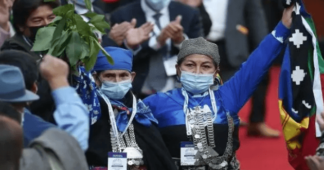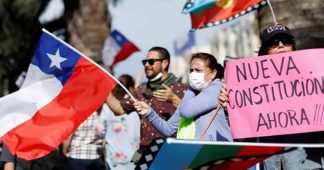Chile’s Rejection
By Camila Vergara
09 September 2022
Pinochet and his legacy have proven hard to kill. The 2022 draft constitution – the most progressive constitution ever written in terms of socio-economic rights, gender equality, indigenous rights and the protection of nature – was rejected by almost 62% of voters in a national plebiscite on 4 September. How could Chileans, after rising up in October 2019 to demand a new constitution, then voting by an overwhelming majority to initiate the constituent process, reject the proposed draft? Why would they align with right-wing forces seeking to preserve the Pinochet constitution? This astonishing result surely demands a multi-causal explanation. Here I will focus on two of the most prominent ones: the right-wing disinformation campaign across traditional and social media, and the exclusion of the popular sectors from the constituent process, which I have highlighted in previous analyses.
Support for Rechazo (‘Reject’) was strongest in low-income municipalities, where turnout was also higher than in upper-class neighbourhoods. While in the 2020 plebiscite the opposition to the constituent process was led by the three wealthiest municipalities, this time around the poorest neighbourhoods turned out en masse to vote against the proposed draft. Also in contrast to 2020, voting was mandatory – with fines for non-compliance – which forced the popular sectors to cast a vote for fear of the pecuniary costs of abstention. Turnout increased substantially from 50% to 86%; and of the 5.4 million new votes cast, 96% opted to reject. In total, the draft constitution received only 4.8 million votes – one million less than voted in favour of redrafting two years earlier. This was not only a vote against the new constitutional text, however. It was also a rejection of Gabriel Boric’s administration and its parties: the ‘new left’ coalition including Frente Amplio, the Communist Party and the parties of the old Concertación. Apruebo (‘Approve’) was supported by roughly the same number of people that voted for Boric in the runoff against the far-right candidate José Antonio Kast in December 2021 – suggesting that he has been unable to expand his constituency since taking office.
At least a million dollars were poured into the month-long campaign to raise awareness about the draft constitution. About 90% of these funds were spent by the Rechazo camp, comprising the right-wing parties, parts of the Christian Democrats and the new centrist coalition ‘Amarillos por Chile’. They repeatedly denounced the document as ‘extremist’ and ‘poorly written’ on morning talk shows and evening news programmes, while conservative thinktanks bombarded audiences with opinion polls of doubtful accuracy showing that most people would vote down the new draft. Such efforts were bolstered by the spread of disinformation on social media, as well as the distribution of fake copies of the draft constitution with doctored articles. In one illustrative episode, the far-right Convention representative Constanza Hube was caught giving out fake copies of the constitution during a Rechazo meeting.
Continue reading at newleftreview.org
Chile’s Vote Was a Rebuke of the 21st-Century Left. Will We Listen?
By René Rojas
12.05.2022
Many pundits and politicians are blaming the radical excesses of the convention, the charter draft, and Apruebo Dignidad, the governing left coalition. Establishment voices claim the public’s rebuke of the draft constitution proves that Chileans are a politically moderate people, and that they are now calling for a restoration of the progressive neoliberalism that has reigned since 1990. New left militants, by contrast, insist that a biased campaign prevented them from accurately conveying the advantages of the new constitution. From their perspective, millionaire meddling, fearmongering, and fake news muddled Chileans’ ability to vote according to their interests.
We remind our readers that publication of articles on our site does not mean that we agree with what is written. Our policy is to publish anything which we consider of interest, so as to assist our readers in forming their opinions. Sometimes we even publish articles with which we totally disagree, since we believe it is important for our readers to be informed on as wide a spectrum of views as possible.











